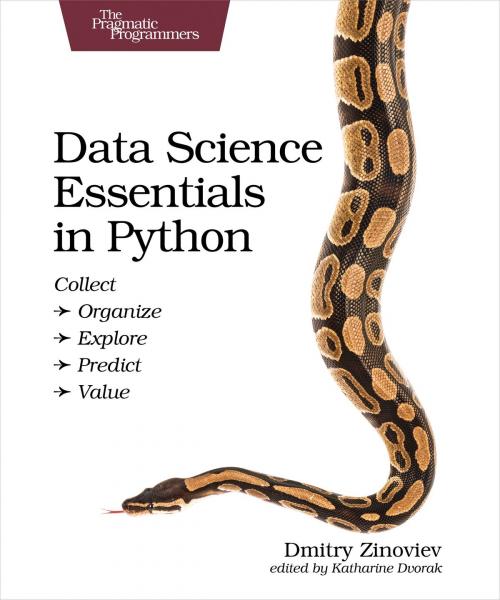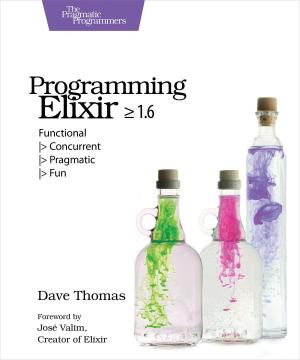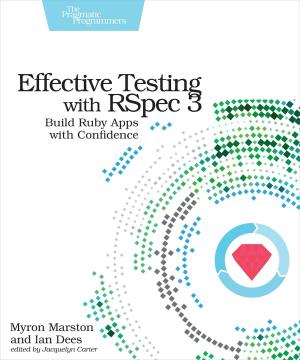Data Science Essentials in Python
Collect - Organize - Explore - Predict - Value
Business & Finance, Management & Leadership, Decision Making & Problem Solving, Nonfiction, Computers, Programming, Programming Languages| Author: | Dmitry Zinoviev | ISBN: | 9781680503388 |
| Publisher: | Pragmatic Bookshelf | Publication: | August 10, 2016 |
| Imprint: | Pragmatic Bookshelf | Language: | English |
| Author: | Dmitry Zinoviev |
| ISBN: | 9781680503388 |
| Publisher: | Pragmatic Bookshelf |
| Publication: | August 10, 2016 |
| Imprint: | Pragmatic Bookshelf |
| Language: | English |
Go from messy, unstructured artifacts stored in SQL and NoSQL databases to a neat, well-organized dataset with this quick reference for the busy data scientist. Understand text mining, machine learning, and network analysis; process numeric data with the NumPy and Pandas modules; describe and analyze data using statistical and network-theoretical methods; and see actual examples of data analysis at work. This one-stop solution covers the essential data science you need in Python.
Data science is one of the fastest-growing disciplines in terms of academic research, student enrollment, and employment. Python, with its flexibility and scalability, is quickly overtaking the R language for data-scientific projects. Keep Python data-science concepts at your fingertips with this modular, quick reference to the tools used to acquire, clean, analyze, and store data.
This one-stop solution covers essential Python, databases, network analysis, natural language processing, elements of machine learning, and visualization. Access structured and unstructured text and numeric data from local files, databases, and the Internet. Arrange, rearrange, and clean the data. Work with relational and non-relational databases, data visualization, and simple predictive analysis (regressions, clustering, and decision trees). See how typical data analysis problems are handled. And try your hand at your own solutions to a variety of medium-scale projects that are fun to work on and look good on your resume.
Keep this handy quick guide at your side whether you're a student, an entry-level data science professional converting from R to Python, or a seasoned Python developer who doesn't want to memorize every function and option.
What You Need:
You need a decent distribution of Python 3.3 or above that includes at least NLTK, Pandas, NumPy, Matplotlib, Networkx, SciKit-Learn, and BeautifulSoup. A great distribution that meets the requirements is Anaconda, available for free from www.continuum.io. If you plan to set up your own database servers, you also need MySQL (www.mysql.com) and MongoDB (www.mongodb.com). Both packages are free and run on Windows, Linux, and Mac OS.
Go from messy, unstructured artifacts stored in SQL and NoSQL databases to a neat, well-organized dataset with this quick reference for the busy data scientist. Understand text mining, machine learning, and network analysis; process numeric data with the NumPy and Pandas modules; describe and analyze data using statistical and network-theoretical methods; and see actual examples of data analysis at work. This one-stop solution covers the essential data science you need in Python.
Data science is one of the fastest-growing disciplines in terms of academic research, student enrollment, and employment. Python, with its flexibility and scalability, is quickly overtaking the R language for data-scientific projects. Keep Python data-science concepts at your fingertips with this modular, quick reference to the tools used to acquire, clean, analyze, and store data.
This one-stop solution covers essential Python, databases, network analysis, natural language processing, elements of machine learning, and visualization. Access structured and unstructured text and numeric data from local files, databases, and the Internet. Arrange, rearrange, and clean the data. Work with relational and non-relational databases, data visualization, and simple predictive analysis (regressions, clustering, and decision trees). See how typical data analysis problems are handled. And try your hand at your own solutions to a variety of medium-scale projects that are fun to work on and look good on your resume.
Keep this handy quick guide at your side whether you're a student, an entry-level data science professional converting from R to Python, or a seasoned Python developer who doesn't want to memorize every function and option.
What You Need:
You need a decent distribution of Python 3.3 or above that includes at least NLTK, Pandas, NumPy, Matplotlib, Networkx, SciKit-Learn, and BeautifulSoup. A great distribution that meets the requirements is Anaconda, available for free from www.continuum.io. If you plan to set up your own database servers, you also need MySQL (www.mysql.com) and MongoDB (www.mongodb.com). Both packages are free and run on Windows, Linux, and Mac OS.















